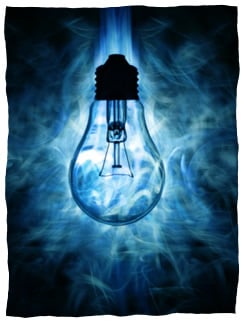On Shabbat, melachah, "work," is prohibited. Our Sages explain that melachah refers to the activities which were necessary for construction of the Tabernacle, 39 types of work in all. Although there are thus many activities that are forbidden on Shabbat by Torah law, the Torah explicitly states only one of them.1 This is the prohibition of igniting a fire: "You shall not ignite a fire in any of your dwelling places on the day of Shabbat."2
There are varying opinions as to why the Torah singles this prohibition out. Some say3 that the Torah spells out this prohibition because kindling a fire is necessary for cooking and food preparation, and the Torah wishes to specify that even these types of work – which are permissible on holidays4 – are forbidden on Shabbat. The Sages of the Talmud5 derive additional shades of meaning from this verse.
In addition to actually kindling a fire, the prohibition against "igniting" also includes:
- Driving a car (which involves combustion).
- Turning on a light switch (since the light bulb gives out both light and heat, it is halachically considered "fire"6).
- Opening a refrigerator or car door if this causes a light to go on.
Electrical Appliances on Shabbat
Some say that turning on the appliance is akin to buildingThere are many appliances whose use is forbidden irrespective of the fact that they are powered by electricity, simply because they perform functions that are forbidden on Shabbat. For example:
- Stoves and microwave ovens involve the melachah of cooking/baking. It is therefore forbidden to turn on or adjust the temperature of these appliances.7
- Turning off a light bulb is considered mechabeh ("extinguishing").
- Running the hot water tap is forbidden on Shabbat as this causes cold water to enter the hot water tank, and this water is in turn heated by the hot water that is already in the tank.8 This is considered cooking.
- Operating a printer would involve the melachah of koteiv ("writing").
It is also forbidden to operate appliances that require electricity even though they do not involve any specific type of melachah. Some examples are electric fans, clocks, or CD players.9 The operation of these electrical appliances is forbidden on Shabbat.
Although the halachic authorities concur that electricity per se is not considered fire (though some say that if completing the circuit will emit sparks, it is considered "igniting"10), it is nevertheless universally agreed upon that one may not operate electrical appliances on Shabbat. There are various reasons offered for this.11
Building
Some say that turning on the appliance, which means completing the electric circuit, is akin to building. An appliance that is connected to a wall socket is considered "built" into the house. One that is battery-operated, when turned on, is considered to be "built" as a completed appliance. Building on Shabbat is a Torah prohibition. According to this opinion, operating electric appliances would be a Torah violation.12
Creation
Some say that operating electrical appliances is a violation of the Rabbinic prohibition of molid—creating. Although creating is not a subcategory of any of the 39 forbidden types of work, it was forbidden by the Rabbis because the act of creation is actually the common denominator of them all.
(This prohibition is mentioned concerning the melting of ice which "creates" water13 as well as concerning the use of perfume on Shabbat, which "creates" a fragrance.14)
One who completes an electric circuit is "creating" that circuit. This is a significant act of creation as this circuit can be utilized to operate various appliances.15
(There are various halachic differences between activities that are forbidden by the Torah versus Rabbinic decree. See, for example, The Myth of the Shabbat Goy.)
Exceptions
One who completes an electric circuit is "creating" that circuitIf an electrical device was turned on before Shabbat, one may or may not be permitted to make use of it on Shabbat. Certain conditions may apply. Several examples are:
- If one boiled the water in an electric urn before Shabbat, most authorities permit using it on Shabbat. Some say that if draining the water completely would break the appliance, it may not be used, as one might forget and add water to prevent this from happening.16 (In any case, when making coffee or tea, one must be careful to follow the rules of not cooking on Shabbat. See Keli Rishon, Sheini and Shlishi.)
- One may use an electric stove or oven to keep food warm provided that the rules of covering the flame, etc., are being followed.17 (See The Laws of Shehiya.)
- It may be permissible to enter certain elevators on Shabbat.18 This might be permitted if:
a) The elevator was programmed before Shabbat to stop at each floor.
b) Entering it will not cause a closing door to open.
Some authorities permit this in only in a hydraulic elevator, while others permit it even in an elevator with a pulley system; in an elevator with a pulley system, some permit using the elevator to go up but not to go down.
Please note that many modern elevators have a built-in scale which automatically weighs the passengers as they enter. I have heard from Rabbi Levi Yitzchak Halperin, the head of The Institute for Science and Halacha in Jerusalem, that such an elevator may not be used on Shabbat.
For the above reasons, it is not sufficient to program a regular elevator to simply stop at every floor to enable its use on Shabbat. Rather, one must find out the specifics of the elevator and discuss its use with a competent halachic authority.
(Some authorities maintain that one may not use elevators under any circumstances.19) - One who needs a hearing aid may use it on Shabbat, provided that he leaves it on from before Shabbat.20 There are different opinions regarding whether it is permitted to walk outside while wearing a hearing aid in a place that doesn't have an eruv.21
- The use of as microphone is forbidden on Shabbat or Yom Tov, even if it was left on from before Shabbat.22
- In cases of need, if there is no other entrance to a building that one must enter, one may follow a gentile through an electric door if this will not cause the door to reopen. He should not ask the gentile to do this for him.23







Join the Discussion